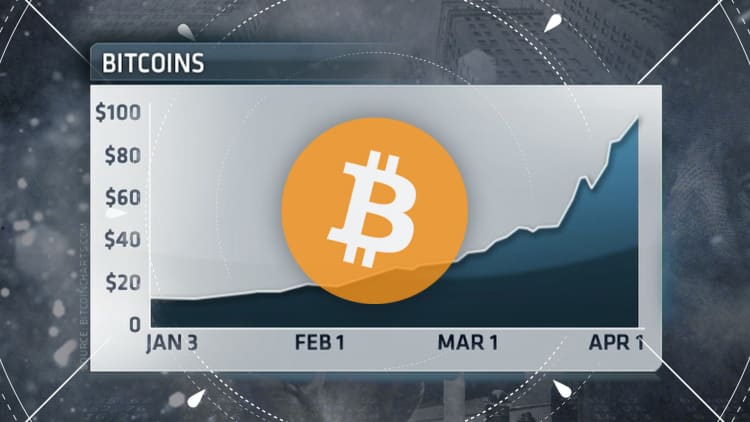The old advice to keep politics and elbows off the dinner table may need to be updated to include bitcoin this year.
Last year at this time, the cryptocurrency was just entering its hot streak, soaring in price because retail investors were buying. But it's likely to be a sore subject for people who bragged during last year's holiday feast about their new investment idea.
Your relatives who took the smug brother-in-law's advice and bought $1,000 worth of bitcoin during the week of Thanksgiving 2017, have lost about $450 of that investment. Those who waited to buy until the week after Thanksgiving 2017 have lost $550. And those who resisted temptation to buy until the week before Christmas last year have lost around $763 of that $1,000 investment.
Bitcoin first topped $10,000 in the last days of November 2017, and by mid-December was worth almost $20,000, according to data from CoinMarketCap.com. Contrast that to this Thanksgiving: Bitcoin's price has sunk back below $4,300 for the first time in 13 months.
Kyle Asman, partner and co-founder of crypto advisory firm BX3 Capital, began using cryptocurrency in 2013 for online gambling. He was shocked when bitcoin came up at his own dinner table.
"Before that it was more of a closet thing," Asman said, though he did notice the price started spiking last year around the holiday. "I remember that was the only time I had talked about it at my Thanksgiving table — some described it as digital gold, others as a new form of money."
In the weeks after Thanksgiving, the price moves became even more exaggerated. Asman recalled being at a holiday party, going into the restroom when bitcoin was $9,000 and returning minutes later to have a friend tell him it was trading at $11,000.
ALSO WATCH: Here's what Gary Shilling really thinks of bitcoin

Fear of missing out
The cryptocurrency's run-up last year granted it sudden pop-culture status and ushered in retail investors thanks to what many call "FOMO," or "fear of missing out."
"It's easy to dismiss crypto as some sort of fake money that's only useful for criminal enterprises, but at some point when the price went up by so much, so quickly, people had no choice but to peek under the hood and see what was going on," said Steve Ehrlich, chief operating officer at Wall Street Blockchain Alliance.
Another phenomenon that took off alongside bitcoin was a new fundraising method called initial coin offerings. ICOs have attracted billions of dollars from investors, often without a live product. Many have been outed as outright frauds, and others have settled with U.S. regulators for not registering as securities.
"These companies raised insane amounts of money and had no pressure to ever deliver," said Ehrlich, a former Citi fintech analyst. "Since then, a lot of people have realized most of the money from ICOs was irresponsible and a lot of those companies are never going to deliver any of those products."
Before popular U.S. exchanges like Coinbase, Ehrlich pointed out that bitcoin was complicated and nearly impossible to buy unless you had a computer science or coding background. Coinbase, valued at $8 billion, at one point was signing up 50,000 new customers a day at the height of the crypto boom last year, CEO Brian Armstrong said at the Bloomberg Players Technology Summit in San Francisco this summer.
But it wasn't all dinner-table hype that led to the epic price rise.
The rapid spike also coincided with the introduction of a bitcoin futures market. Peak prices lined up with the day the Chicago Mercantile Exchange introduced bitcoin futures trading on Dec. 17. The Chicago Board Options Exchange opened a futures market a week earlier.
Until futures existed, it was extremely difficult, if not impossible, to bet on the decline of bitcoin prices.
This week, bitcoin futures products hit their lowest level since they were introduced. Research from the San Francisco Federal Reserve suggests bitcoin futures were partly to blame, as investors finally got the option to bet against the cryptocurrency.
U.S. regulators have flagged other potentially nefarious reasons for bitcoin's stratospheric rise last year.
The Justice Department is reportedly looking into whether traders used tether, a controversial cryptocurrency that founders say is backed one-to-one by a U.S. dollar, to prop up bitcoin during its record-breaking rally, according to Bloomberg News, which cited three people familiar with the matter.
Some academics are also skeptical. University of Texas finance professor John Griffin, who has a 10-year track record of spotting financial fraud, and graduate student Amin Shams published a study in June that said at least least half of the jump in bitcoin was due to coordinated price manipulation.
At key moments when bitcoin was declining, they said tether was used to buy bitcoin to help "stabilize and manipulate" the cryptocurrency's price.
Despite the massive losses this year, Asman think his own family members remain curious and open to the conversation. But this year, the theme might be less about the "crazy euphoria" of last year and more about looking ahead to 2019.
"A lot of people are going to wonder what happened, and what comes next," Asman said.



